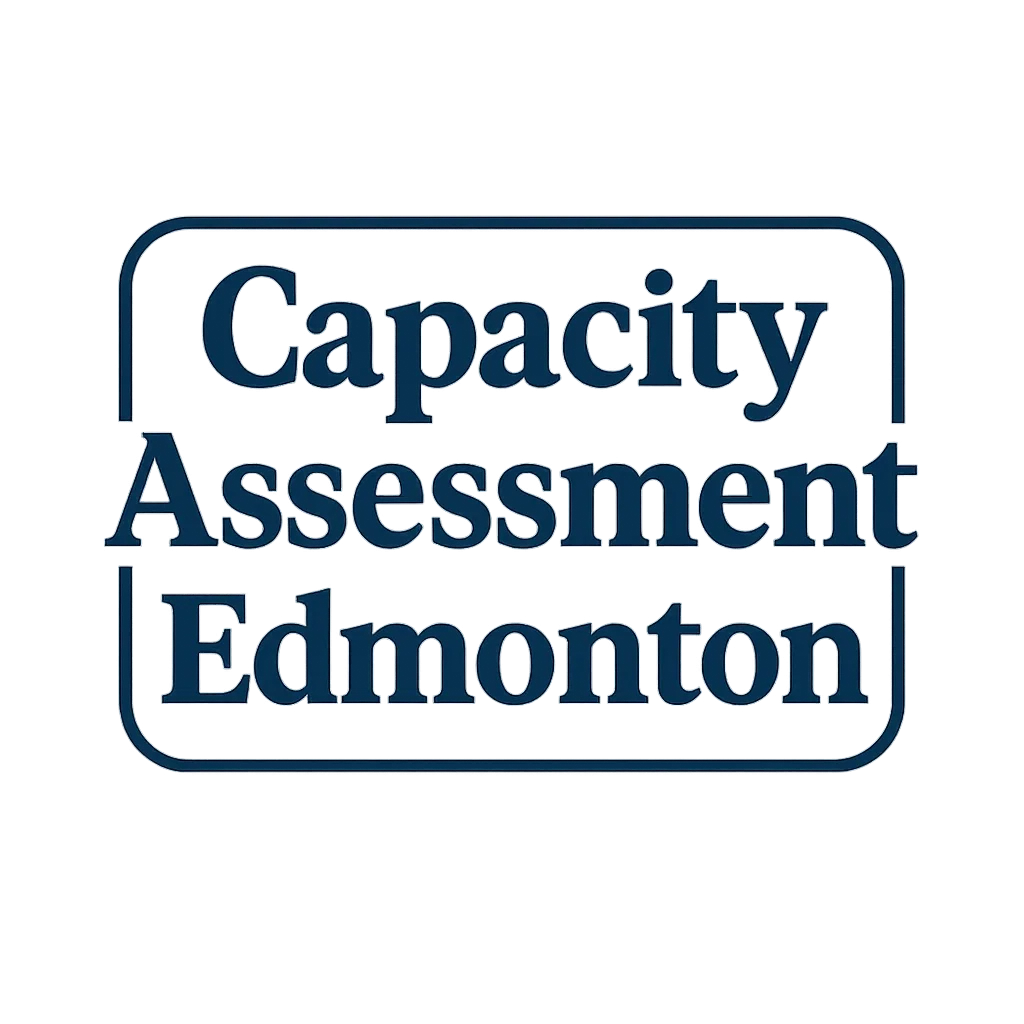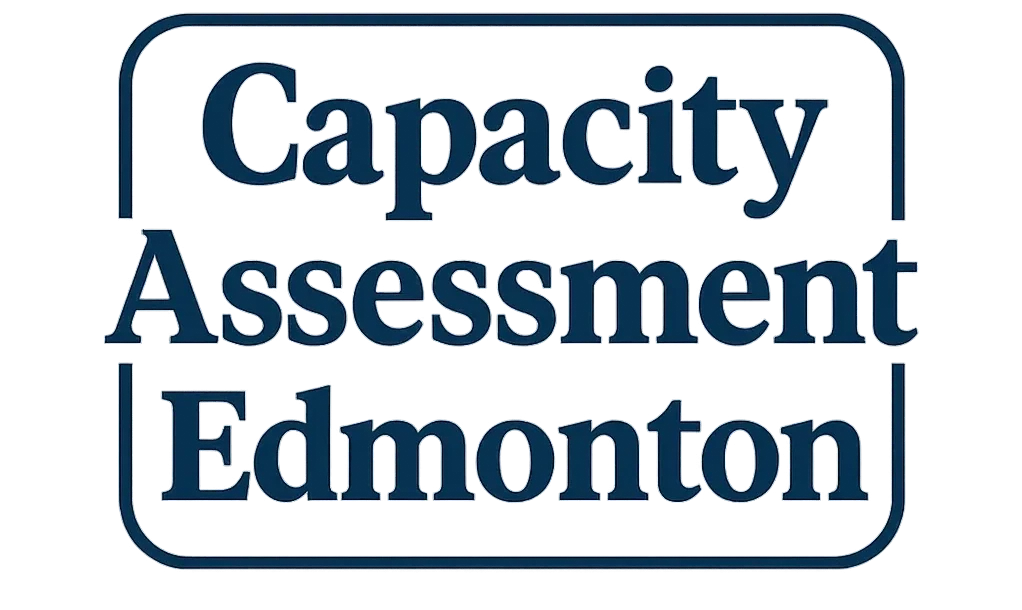Capacity Assessment in Greater Edmonton Area
Capacity assessor near me
July 31, 2025

Beyond Assessment: Navigating Capacity, Compassion, and Clarity in Edmonton

A few years back, my neighbor Mrs. Jenkins—who’s sharp as a tack but a bit forgetful—sat me down over a cup of tea and asked, “How do I prove to my daughter I’m still able to make my own choices?” That quick chat sent me down a rabbit hole about Capacity Assessment in Edmonton: a topic that matters tremendously, but is so often wrapped in legalese and misconceptions. I discovered that the true story is about dignity, compassion, and making sense of complexity, whether you’re seeking a Capacity Assessor near you, wrestling with paperwork, or just trying to sleep at night. Today, let’s untangle Edmonton’s capacity assessment with a little more heart and a dash of humanity.
Capacity Assessment Edmonton: What It Really Means (And Why You Might Care Someday)
When I first heard the term Capacity Assessment Edmonton, I’ll admit, it sounded like just another piece of paperwork. But as I’ve learned, it’s much more than that. In reality, a capacity assessment is about protecting autonomy, clarifying legal decision-making, and offering peace of mind to families and individuals facing uncertain times. It’s not just something for the elderly or those in care homes. Anyone—whether facing a sudden health change, a brain injury, or a major life transition—might find themselves needing a capacity assessment someday.
It’s Not Just Paperwork—It’s About Rights and Dignity
There’s a common misconception that capacity assessments are just bureaucratic hurdles. But research shows these assessments are designed to protect dignity and rights, not simply to tick boxes. As Dr. Olivia Tran, a local capacity assessor, puts it:
“A thorough capacity assessment is about ensuring the individual’s rights are protected, not just checking boxes.”
That perspective really shifted my view. The process isn’t about taking control away—it’s about making sure decisions are made in the best interest of the person, with their voice at the center.
Guided by the Adult Guardianship and Trusteeship Act (AGTA)
In Alberta, the Adult Guardianship and Trusteeship Act (AGTA) sets the legal framework for capacity assessments. This act lays out clear rules and safeguards, ensuring that everyone involved—families, healthcare professionals, and legal representatives—knows what to expect. The AGTA is there to provide legal clarity, but also to make sure that the process is fair and transparent for all adults, not just seniors.
Who Needs a Capacity Assessment?
It’s easy to assume these assessments are only for older adults. In reality, anyone might need a Capacity Assessment Edmonton if they’re facing:
- Major health changes or hospitalization
- Brain injuries or neurological conditions
- Life transitions that raise questions about decision-making
- Contested wills or concerns from caregivers
And with services now available both at home and online, finding a Capacity Assessment Near Me is more convenient than ever.
The Role of the Capacity Assessor in Edmonton
A Capacity Assessor Edmonton is a specially trained professional—often a registered nurse, social worker, or psychologist—who evaluates a person’s ability to understand information, communicate choices, and make decisions. The assessment isn’t a one-size-fits-all process. It’s structured, but flexible, and always considers the individual’s unique situation. The process usually includes a pre-assessment, a medical evaluation, and a formal interview.
The Capacity Assessment Report (CAR): Bringing It All Together
At the end of the process, the Capacity Assessment Report (CAR) is produced. This isn’t just a checklist—it’s a detailed blend of medical, social, and functional insights. Both the healthcare and legal systems rely on this documentation to make informed decisions about guardianship, co-decision-making, or trusteeship. The CAR is what helps families, professionals, and the courts see the full picture.
Stories from the Community: Peace of Mind and Honest Conversations
I’ve heard stories from families who say the assessment brought them peace of mind, even when the conversations were tough. There’s a myth that a capacity assessment means “losing control,” but in truth, it’s designed to clarify autonomy, not remove it. Capacity isn’t black and white—it can change over time, and the assessment process recognizes that.
In Edmonton, capacity assessment services are accessible, compassionate, and built to support individuals and families through challenging times. Whether you’re searching for a Capacity Assessment Near Me or just want to understand your options, knowing what the process really means can make all the difference.
Unpacking the Process: From Pre-Assessment to That Slightly Awkward Formal Interview
When I first heard about the Capacity Assessment Process in Edmonton, I’ll admit, it sounded a bit intimidating. But as I learned more—especially from local providers like Lifemax Occupational Therapy and Edmonton Counselling Services—I realized it’s designed to be as supportive and straightforward as possible. If you’re searching for a “Capacity Assessment Near Me” or wondering what to expect from a Designated Capacity Assessor Edmonton, here’s how the process usually unfolds.
Step 1: The Pre-Assessment Chat
Let’s start at the beginning. The Pre-Assessment isn’t a test or a pop quiz. It’s more of a conversation. The assessor—often a registered nurse, social worker, or psychologist with special training in Alberta’s Adult Guardianship and Trusteeship Act (AGTA)—takes time to understand your concerns, your background, and the specific situation. They’ll ask about daily routines, health history, and any recent changes. I’ve found this stage is much less scary than it sounds. It’s about building trust and making sure everyone is on the same page before moving forward.
Step 2: Medical Evaluation
Next comes the Medical Evaluation. This part is handled by healthcare professionals who look for any medical or psychological factors that could affect a person’s decision-making abilities. It might involve reviewing medical records, talking with doctors, or even a physical exam. The goal is not to judge, but to get a complete picture. Research shows that this stepwise approach ensures both thoroughness and empathy, balancing legal requirements with a genuine concern for the individual’s well-being.
Step 3: The Formal Capacity Interview
Now, the part that can feel a bit awkward—the Formal Capacity Interview. Yes, there are questions. Yes, it’s structured. But it’s also about context and compassion. The Designated Capacity Assessor Edmonton is trained to ask about understanding, appreciation, reasoning, and communication. They want to know if the person can make informed decisions about their own life. But as Samantha Ruth, a DCA, puts it:
“Assessment isn’t about catching someone out; it’s about understanding their world.”
That perspective really shifts the tone. It’s not an interrogation. It’s a chance to share your story, your values, and your wishes.
Who Are the Designated Capacity Assessors?
In Edmonton, Designated Capacity Assessors include registered nurses, social workers, and psychologists. Each has specialized training in Alberta law and the AGTA. They’re listed by region and employer, so you can find someone local and experienced. Many providers, like Lifemax Occupational Therapy, even offer in-home or online assessments for added convenience.
Patient-Centred, Family-Inclusive Approach
One thing I appreciate is how patient-centred the process is. Your best interests—and your stories—matter. Family input is often encouraged, as loved ones can provide valuable context. This individualized approach helps ensure the assessment is fair and accurate.
The Outcome: Capacity Assessment Report
After all these steps, the assessor prepares a Capacity Assessment Report (CAR). This document is practical and clear, outlining findings and recommendations. It’s used by families, trustees, or guardians to help make important decisions, whether that’s for legal guardianship, co-decision-making, or trusteeship. The CAR is a tool, not a verdict—meant to support, not limit.
If you’re navigating this process in Edmonton, know that it’s designed to offer clarity, compassion, and legal compliance every step of the way.
Capacity Assessment Fees: It’s Not All About the Bottom Line (But Let’s Be Honest, Cost Counts)
When I first started looking into Capacity Assessment Fees in Edmonton, I’ll admit—I was a little overwhelmed. There’s a lot of talk about compassion, clarity, and the importance of the process, but at the end of the day, cost is a real factor for most families. If you’re searching for Capacity Assessment Near Me or comparing Capacity Assessment pricing Edmonton, you’re probably wondering what you’ll actually pay, and what those fees really cover.
Let’s break it down simply. In Edmonton, the typical fee for a capacity assessment falls between $500 and $700 CAD. This is the range I’ve seen most often, especially with reputable providers like Edmonton Counselling Services. But, and this is important, that number isn’t set in stone. If you need an urgent assessment or if the assessor has to travel outside the city, the cost can go up. Travel fees can sneak up on you, so always ask about them up front—especially if you live outside Edmonton proper.
Why does the price vary so much? It’s not just about the time spent. The context really matters. For example, if you’re seeking a capacity assessment for Guardianship or Trusteeship, the process can be more complex. Some cases require more in-depth evaluation, extra documentation, or coordination with other professionals. That’s where the higher end of the fee range comes in. And if you’re in a rush, some providers charge a premium for urgent requests.
One thing I’ve noticed is that transparency around Capacity Assessment Fees isn’t always consistent. Some providers are upfront about their pricing, while others bury extra costs in the fine print. My advice? Always ask for a full, written quote before you agree to anything. Don’t be shy about asking what’s included—does the fee cover the entire process, or are there extra charges for travel, reports, or follow-up questions?
It’s also worth checking if any part of the fee can be covered by insurance, government programs, or agencies. While not everyone qualifies, some insurers or public agencies may help with the cost, especially if the assessment is related to a medical or legal requirement. It never hurts to ask. I’ve heard stories—like Jane and her brother, who split the cost for their mom’s assessment. It was straightforward, but only because they asked the right questions and planned ahead.
Here’s a pro tip I wish I’d known earlier: If you’re looking for an in-home Capacity Assessment Edmonton, always confirm travel fees. Some providers, like Lifemax Occupational Therapy Inc., offer in-home services, but travel outside city limits can add a significant charge. That’s not always obvious on the website, so a quick phone call can save you from surprises later.
When comparing Capacity Assessment pricing Edmonton, don’t just look at the bottom line. Research shows that higher fees sometimes reflect greater expertise or the ability to accommodate urgent timelines. Check reviews, ask about qualifications, and make sure you’re comfortable with the provider’s approach. As one family caregiver put it:
“Investing in a trusted assessor brings peace of mind—sometimes, you can’t put a price on that.” – Michael W. Hayes, Family Caregiver
Ultimately, the right Capacity Assessor Edmonton should be clear about their fees, transparent about what’s included, and willing to answer your questions. The process is about more than just numbers, but being informed about costs helps you make the best decision for your family and your peace of mind.
Wild Cards and Curveballs: Personal Stories and Unexpected Hurdles
When I first started learning about the world of capacity assessments in Edmonton, I expected a straightforward process: a checklist, a few interviews, a clear answer at the end. I quickly realized that, in reality, every assessment is its own story—full of unexpected twists, emotional ups and downs, and sometimes even a little humor. If you’ve ever searched for Capacity Assessment Edmonton testimonials or wondered what really happens behind the scenes, you’ll know what I mean.
Let me share one story that sticks with me. A family reached out, worried about their Aunt Rose. She’d been forgetting appointments, misplacing her keys, and repeating herself. The family assumed she was losing capacity and needed a guardian. But during the in-home capacity assessment, the assessor noticed something off about Rose’s medication schedule. After a quick call to her doctor and a small adjustment, Rose’s memory improved almost overnight. It wasn’t incapacity—it was a medication issue. This experience taught everyone involved that sometimes, what looks like a decline in capacity is actually something much simpler (and fixable).
Of course, not every story is so clear-cut. I remember hearing about an online session—a capacity assessment conducted over Zoom, thanks to the flexibility now offered by many providers in Edmonton. The family was nervous, the client was anxious, and just as the assessor began the interview, the family dog started barking uncontrollably in the background. It broke the tension, everyone laughed, and the conversation became much more relaxed. Technology brings its own set of challenges, but sometimes those curveballs actually help us connect on a more human level.
What stands out most from Capacity Assessment Edmonton testimonials is how varied the outcomes can be. Not every assessment ends with trusteeship or guardianship. Sometimes, the process reveals that the person just needs a bit more support—maybe help with finances, or reminders for daily tasks. In other cases, after a period of illness or stress, someone might regain their autonomy entirely. There are also situations where a guardian is appointed, but their role is more about support than control. The goal is always to respect the individual’s rights and wishes as much as possible.
The emotional journey can be complicated. Families often feel a mix of relief, guilt, confusion, and even empowerment. One daughter, Leah Patel, put it best:
“The real test was discovering our family had more resilience than we thought.”
Research shows that capacity assessment experiences vary widely, and having access to local Capacity Assessment resources Edmonton can make all the difference. Community support services—like those listed on Capacity Assessment Edmonton—are invaluable, both before and after the assessment. They offer guidance, counseling, and practical help, whether you’re looking for an in-home capacity assessment or exploring options for an online session.
It’s also important to remember that not all outcomes are permanent or restrictive. Sometimes, assistance is only needed for a short while. Human stories like Aunt Rose’s highlight the complexity that goes far beyond paperwork and legal forms. And as technology continues to evolve, so do the ways we connect, assess, and support each other—even if it means navigating the occasional barking dog or technical glitch.
If you’re facing a capacity assessment in Edmonton, know that you’re not alone. There are resources, professionals, and community services ready to help you through every wild card and curveball along the way.
Finding the Right Capacity Assessor in Edmonton: Where to Start (and What to Avoid)
When it comes to finding a Capacity Assessor in Edmonton, I know how overwhelming the process can feel. There’s a lot at stake—your loved one’s rights, their future, and your peace of mind. It’s not just about ticking boxes; it’s about choosing someone who understands both the legal requirements and the human side of capacity assessment. So, where do you even begin?
Start with Government-Approved Designated Capacity Assessors
First, it’s important to know that not everyone can legally perform a capacity assessment in Alberta. The province has a list of Designated Capacity Assessors—these are professionals like registered nurses, social workers, and psychologists who have been specially trained and approved. You can find these official lists by region and employer on Alberta.ca. This step is crucial. Research shows that using a government-approved assessor ensures the process follows the Adult Guardianship and Trusteeship Act (AGTA) and protects everyone involved.
Don’t Just ‘Google and Hope’—Look for Credentials and Experience
I get it. Typing “Capacity Assessor Edmonton” or “Capacity Assessment Near Me” into a search engine is tempting. But not every provider you find online is qualified or experienced. It’s easy to get lost in a sea of websites and ads. Instead, look for transparent credentials—are they listed as a Designated Capacity Assessor? Do they mention AGTA experience? Patient testimonials can also offer insight into their approach and bedside manner. As Linh Carter, a local social worker, puts it:
‘Choosing the right assessor means finding someone who respects both the rules and the person.’ – Linh Carter, Social Worker
Local Resources Matter: Reviews, Word-of-Mouth, and Personal Touch
In my experience, local resources can make all the difference. Edmonton has several reputable Capacity Assessment providers, like Lifemax Occupational Therapy Inc. and Edmonton Counselling Services. Both offer in-home and online options, which can be a game-changer for families dealing with mobility or health challenges. Reviews and word-of-mouth recommendations are especially helpful here. Sometimes, a quick conversation with someone who’s been through the process gives you more clarity than hours of online research.
Understanding Functional Capacity Evaluation (FCE) in Edmonton
It’s worth noting that Functional Capacity Evaluation Edmonton is not the same as a legal capacity assessment. FCEs focus on physical and cognitive abilities related to work readiness or injury recovery, often provided by clinics like Granville Physiotherapy. Sometimes, both types of assessments are requested together, especially after an injury. Make sure you’re clear on which service you need—and that your provider is qualified for both, if necessary.
Checklist: What to Ask Before You Decide
- Verify qualifications: Are they on the official Alberta list of Designated Capacity Assessors?
- Ask about the process: What steps are involved? Will there be a pre-assessment, medical evaluation, and formal interview?
- Request references: If you’re unsure, ask for patient testimonials or references.
- Consider bedside manner: Does the assessor seem patient and compassionate?
- Check for transparency: Are fees, timelines, and expectations clear from the start?
Finding a Capacity Assessor in Edmonton doesn’t have to be a guessing game. By focusing on government-approved professionals, using local resources, and asking the right questions, you can move forward with confidence—and compassion.
Beyond Assessment: Building a More Compassionate System for Everyone
When I think about the future of capacity assessments in Edmonton, I see a shift happening—a move away from cold, checklist-driven evaluations toward a more human, patient-centred approach. It’s not just about ticking boxes or meeting legal requirements. It’s about understanding the person, their needs, and the support systems around them. This is where the real value of a Capacity Assessment patient-centred approach comes into play.
Advocating for accessible capacity assessments means recognizing that everyone’s situation is unique. Some people feel most comfortable in their own homes, surrounded by familiar things. Others might prefer the privacy of a clinic or the convenience of an online meeting. In Edmonton, I’ve noticed more providers offering flexible options—whether it’s in-home visits, virtual assessments, or traditional clinic appointments. This flexibility is more than just a convenience; it’s a sign of respect for the individual’s comfort and dignity.
But here’s something I’ve learned: Capacity Assessment isn’t a one-and-done process. Needs can change. Life circumstances shift. Someone who seemed fully independent last year might need extra support today. That’s why regular review and ongoing Capacity Assessment expert guidance are so important. It’s not about labelling someone for life; it’s about meeting them where they are, right now.
Education is another piece of the puzzle. There’s still a lot of misunderstanding—and sometimes even shame—around capacity and legal guardianship. I’ve met families who felt lost or embarrassed when the topic first came up. But the more we talk openly about these issues, the less stigma there is. Public awareness campaigns, community workshops, and simple, clear information can make a world of difference. When people understand what a Capacity Assessment legal guardianship process really involves, it becomes less intimidating and more empowering.
Support matters, too. No one should have to navigate this journey alone. In Edmonton, there’s a growing network of professionals—occupational therapists, social workers, psychologists—who provide Capacity Assessment support Edmonton and walk families through every step. Community organizations and peer support groups are also stepping up, offering practical help and a listening ear. Sometimes, just knowing you’re not alone is enough to make things feel manageable.
I sometimes wonder: what if every assessment included a comfort animal? It’s a quirky thought, but imagine how much easier those tough conversations might be with a gentle dog curled up nearby or a purring cat in your lap. Maybe it wouldn’t solve every problem, but it could make the process feel a little less clinical and a little more compassionate. After all, research shows that broadening access and empathy in capacity assessment improves outcomes for everyone involved.
“We’re moving toward a model where assessments mean support, not just scrutiny.” – Dr. Marcus Green, Geriatrician
In the end, I believe the most effective capacity assessments are built on kindness, clarity, and a genuine desire to help. You can’t measure the comfort of a warm cup of tea or the reassurance of a friendly face on any official form, but those small things matter. They remind us that behind every assessment is a real person, with real hopes and fears, deserving of respect and understanding.
Conclusion: Untangling Capacity in Edmonton—A Personal Reflection
As I reflect on my journey exploring Capacity Assessment Edmonton, I realize that the process is about so much more than just ticking boxes or signing forms. It’s easy to think of capacity assessment as a legal requirement or a bureaucratic step, but in reality, it’s a deeply human process—one that’s designed to protect dignity and support individuals and families during times of uncertainty.
When I first started looking into capacity assessment near me in Edmonton, I felt overwhelmed. There were so many terms, so many steps, and honestly, a fair amount of fear. What if I made a mistake? What if I didn’t understand the paperwork? But as I spoke with local professionals and read through the resources available, I started to see a different side of the process—one that’s rooted in compassion, transparency, and flexibility.
Research shows that a supportive assessor and a clear process can make all the difference. Services like Capacity Assessment Edmonton and others in the city have shaped their approach around these values. Whether it’s Lifemax Occupational Therapy Inc. offering in-home assessments that follow the Adult Guardianship and Trusteeship Act, or Edmonton Counselling Services providing government-approved assessments, the focus is always on making the experience as smooth and respectful as possible.
I’ve learned that capacity assessment guidance in Edmonton isn’t just about legal compliance. It’s about ensuring that people feel heard, respected, and supported at every step. As Sarah Yu, a local capacity assessor, puts it:
‘At the end of the day, capacity assessment should leave you feeling heard, respected, and supported.’ – Sarah Yu, Capacity Assessor
That quote stuck with me. It’s a reminder that behind every assessment, there’s a person—someone’s parent, sibling, or friend—who deserves empathy and understanding. The best assessors in Edmonton, I’ve found, are those who combine expertise with strong communication skills. They take the time to explain the process, answer questions, and offer reassurance when things feel overwhelming.
If there’s one piece of advice I can offer, it’s this: don’t wait for a crisis to start learning about your options. The more informed you are now, the less stressful things will be if and when you need to make decisions quickly. Edmonton’s capacity assessment resources are designed to help you navigate these situations with clarity and confidence. Whether you’re considering guardianship, co-decision-making, or just want to understand what’s involved, reaching out to a professional can make a world of difference.
And if you ever find yourself staring at a complex form online at midnight, unsure of what to do next—pause. Take a breath. Then reach out for help. There’s no shame in asking questions or seeking guidance. In fact, that’s exactly what these services are here for.
Capacity is a complex topic, but with the right support, it’s manageable. Edmonton’s network of assessors, counsellors, and therapists are committed to making the process as clear and compassionate as possible. My hope is that by sharing my experience and what I’ve learned, I can encourage others to seek help, reduce their fear, and stay informed.
In the end, capacity assessment in Edmonton is about more than paperwork—it’s about people. And with the right guidance, you don’t have to navigate it alone.
TL;DR: You don’t have to wade through legal jargon or uncertainties alone—Edmonton offers structured, empathetic capacity assessment services tailored to your needs and circumstances. Whether you’re supporting a parent, preparing for a legal transition, or just curious, a local expert can help make the journey clearer and a bit less daunting.
Capacity Assessment in Edmonton
Looking for Capacity Assessment service in Edmonton or anywhere near Edmonton ? We can Help . Call us today .




